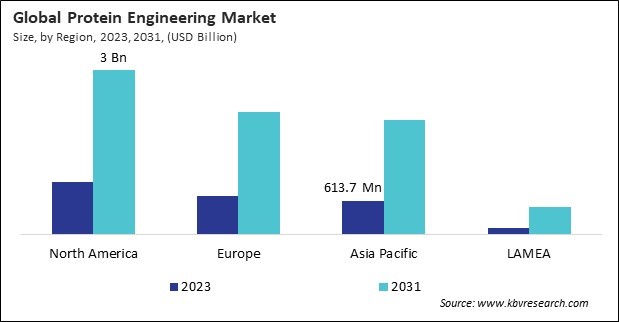Int'l : +1(646) 832-2886 | query@kbvresearch.com
Int'l : +1(646) 832-2886 | query@kbvresearch.com
Industry Insights | Market Trends | Highest number of Tables | 24/7 Analyst Support
According to a new report, published by KBV research, The Global Protein Engineering Market size is expected to reach $7.8 billion by 2031, rising at a market growth of 16.0% CAGR during the forecast period.
The Instruments segment is generating the highest revenue in the Global Protein Engineering Market by Product in 2023; thereby, achieving a market value of $3.8 billion by 2031. This can be attributed to the high demand for sophisticated protein engineering research and development instruments, such as chromatography, mass spectrometers, and protein crystallization systems.

The Pharmaceutical & Biotechnology Companies segment is registering a CAGR of 15.5 % during the forecast period. This is due to the fact that the pharmaceutical and biotechnology industries have a significant demand for protein engineering technologies for the purposes of drug discovery, development, and production.
The Rational Protein Design segment led the Global Protein Engineering Market by Technology in 2023; thereby, achieving a market value of $2 billion by 2031. Rational protein design uses computational methods to predict and modify protein structures for specific functions or properties. This approach is favored for its precision and efficiency in protein engineering, leading to its widespread adoption in drug discovery, enzyme engineering, and other biotechnological applications.
The Monoclonal Antibodies segment is growing at a CAGR of 13.6 % during the forecast period. A revolutionary development has been the application of monoclonal antibodies to the treatment of autoimmune disorders and cancer. They are designed to bind specifically to antigens on cancer cells or immune cells, thereby marking them for destruction by the body's immune system or blocking harmful processes.
Full Report: https://www.kbvresearch.com/protein-engineering-market/
The North America region dominated the Global Protein Engineering Market by Region in 2023, and would continue to be a dominant market till 2031; thereby, achieving a market value of $3 billion by 2031. The Europe region is anticipated to grow at a CAGR of 15.6% during (2024 - 2031). Additionally, The Asia Pacific region would witness a CAGR of 16.7% during (2024 - 2031).
By Product
By End-use
By Technology
By Protein Type
By Geography
Related Reports: